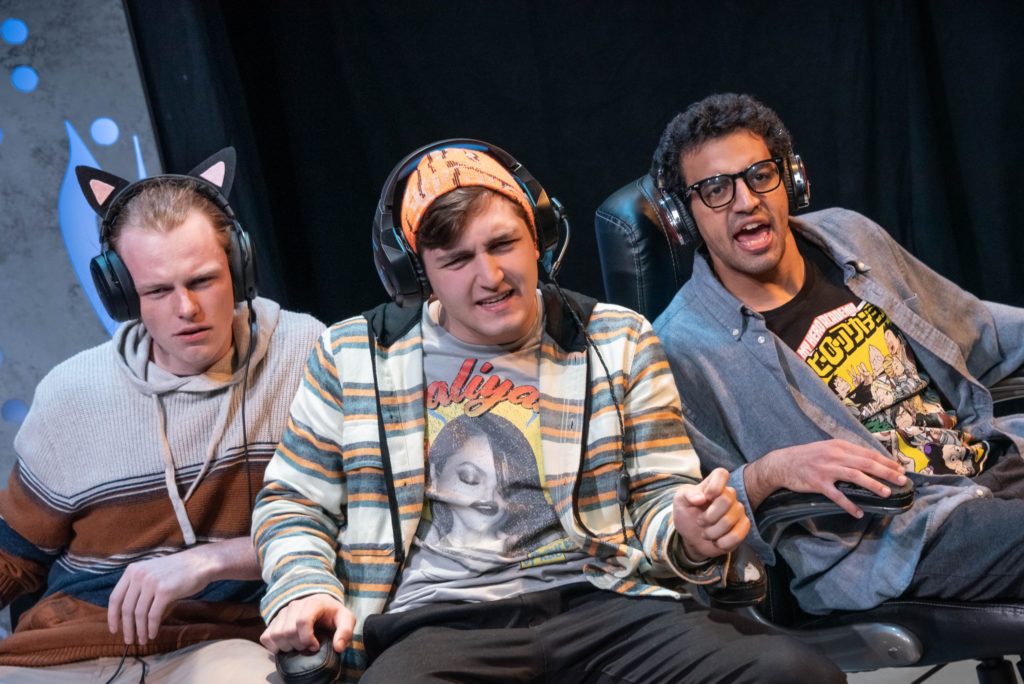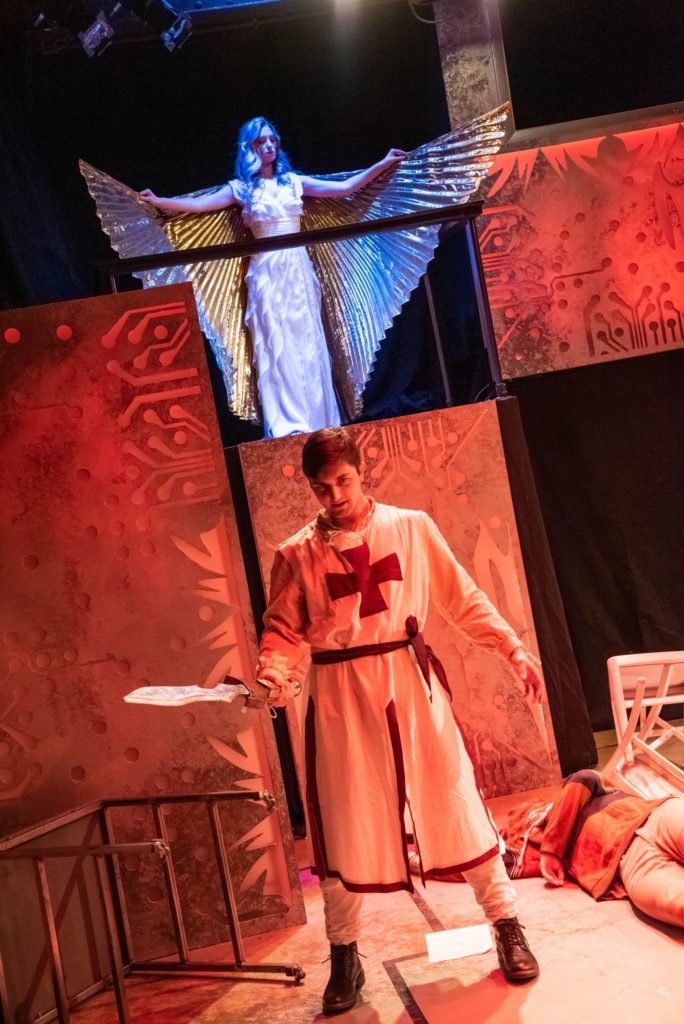
Photo by Stratton McCrady: Matthew Swain, Julien Tornelli, Fady Demian.
Presented by Boston Playwrights’ Theatre
Written By Ally Sass
Directed by Erica Terpening-Romeo
A BU New Play initiative production
Produced by Boston Playwrights’ Theatre and the Boston University College of Fine Arts School of Theatre
December 2-12, 2021
Boston Playwrights’ Theatre
949 Commonwealth Avenue
Boston, MA 02215
BPT on Facebook
Review by Diana Lu
BOSTON — Incels and Other Myths invites the audience into the world of massive multiplayer online gaming and the Lord of the Flies corners of the internet, where misogyny has even less consequences than in the physical world. Elaine (Allison Blaize), a mythology teacher at an all-girls high school, and her precocious but awkward son Avery (Aidan Close) play the historical fantasy game, “Oracle.” In “Oracle,” they try on highly gendered, performative personas and encounter friends and monsters that help them get in touch with integral parts of themselves they couldn’t face in real life.
The actors were all superb and brought the world of the play to life. They had actors playing the in-game avatars of the characters on a different part of the stage, which was an effective way to portray the immersive gaming experience. I particularly liked Aidan Close’s effervescent, ranged performance as Avery.
The writing was technically very good and the playwright clearly has great potential as an artist. It was a two-hour show but it did not feel long. I am excited to see future work by playwright Ally Sass. Among other brilliant moments, there was a lovely monologue about Medusa growing to love her snakes.
Yet at the end I was left feeling like there was no closure. This is partly due to the difficulty inherent to the subject matter. All the characters interact superficially and their inner lives exist mostly in isolation, so it is difficult to build dramatic tension or flesh them out via dialogue.
Also, a lot of story threads were happening at the same time and because none were explored deeply, the final climactic scene felt hollow and unsatisfying. That said, many aspects of world-building and narrative could have been more effective.
I am surprised that, in 2021, a script written by a woman doesn’t pass the Bechdel Test. Elaine addresses her female students (the audience) regularly, but they weren’t characters and didn’t have a voice. Every other character in the play is obsessed with these young women in one way or another, but the girls remained silent, which troubled me. Even the Greek Chorus had something to say.
The Gen-X characters were written as such weak people that they aren’t credible. Mr. Anderson (Jesse Hinson) comes across as a human Crying Dawson meme. Elaine is a single mom with a successful career and I just can’t believe that she would destroy her life over one perceived sexual rejection.
While I appreciated the suggestion that if everyone acted as entitled and self-indulgent as straight men do then society would crumble, no grown woman is obsessing over Becky’s sharp elbows or knock-off James Vander Beek’s dick. If she is, something deeper is going on and unraveling that needs to be central to the story.

Photo by Stratton McCrady: Katherine Schaber (top), Julien Tornelli
The ending implied that male and female rage are equally harmful, two sides of the same coin. This may be true on a personal level in a vacuum, but that reading completely ignores systemic sexism as a caste system. Likewise, the subtext of the entire play is that the characters live in an upper middle class, heteronormative, WASPy sociological context, but that’s just treated as a universal ground truth and left unexamined as pathogenesis of our current sociological ills.
Finally, the play missed the opportunity to use the minotaur myth as an allegory for broader examination of hegemonic patriarchy. They left out the most important part of the minotaur myth: it was born to Pasiphae as a punishment for King Minos because he tried to deceive Poseidon. The minotaur was therefore the fruits of paternalistic greed and hubris and the manifestation of a conflict between men negotiated on a woman’s body. This is just as all the characters in the play enter Oracle, later revealed to be a winged woman, and negotiate all their personal problems inside her.
There are so many facets to this cultural moment, and Incels and Other Myths was set up to dive into any one of them and say something profound, but didn’t. Perhaps the current zeitgeist is too close to us and artists need more time, life experience, and critical theory to interpret in a meaningful way.
In any case, to me, gender parity begins when men no longer have permission to invade women’s mental, emotional and physical spaces. When they do not have permission to externalize their personal issues onto women’s bodies, and our society no longer manufactures consent from women to allow this. Judging by the current text, Gen Z is full of promise, but we have a long way to go.
